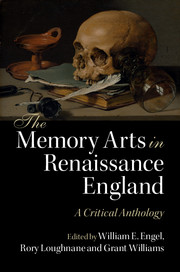Book contents
- Frontmatter
- Dedication
- Contents
- List of figures
- Acknowledgements
- A note on abbreviations
- Introduction
- PART I The art of memory
- PART II Rhetoric and poetics
- PART III Education and science
- Introduction to Part III
- III.1 Thomas Elyot, The Governor (1531)
- III.2 Roger Ascham, The Schoolmaster (1570)
- III.3 Levinus Lemnius, The Touchstone of Complexions (1576)
- III.4 William Kempe, The Education of Children (1588)
- III.5 John Brinsley, Ludus literarius (1612)
- III.6 Robert Burton, The Anatomy of Melancholy (1621)
- III.7 Thomas Sprat, The History of the Royal Society (1667)
- III.8 John Wilkins, An Essay towards a Real Character (1668)
- III.9 Obadiah Walker, Of Education (1673)
- III.10 Robert Hooke, ‘An Hypothetical Explication of Memory’ (1682)
- PART IV History and philosophy
- PART V Religion and devotion
- PART VI Literature
- Index
- References
III.4 - William Kempe, The Education of Children (1588)
from PART III - Education and science
Published online by Cambridge University Press: 05 August 2016
- Frontmatter
- Dedication
- Contents
- List of figures
- Acknowledgements
- A note on abbreviations
- Introduction
- PART I The art of memory
- PART II Rhetoric and poetics
- PART III Education and science
- Introduction to Part III
- III.1 Thomas Elyot, The Governor (1531)
- III.2 Roger Ascham, The Schoolmaster (1570)
- III.3 Levinus Lemnius, The Touchstone of Complexions (1576)
- III.4 William Kempe, The Education of Children (1588)
- III.5 John Brinsley, Ludus literarius (1612)
- III.6 Robert Burton, The Anatomy of Melancholy (1621)
- III.7 Thomas Sprat, The History of the Royal Society (1667)
- III.8 John Wilkins, An Essay towards a Real Character (1668)
- III.9 Obadiah Walker, Of Education (1673)
- III.10 Robert Hooke, ‘An Hypothetical Explication of Memory’ (1682)
- PART IV History and philosophy
- PART V Religion and devotion
- PART VI Literature
- Index
- References
Summary
About the author
William Kempe (c. 1560–1601) matriculated at Christ's College, Cambridge, but graduated BA (1580/1) and proceeded to MA (1584) at Trinity Hall, Cambridge. While working as a master at Plymouth Grammar School, he gained renown for his writings about education, including The Education of Children (1588) and, a translation of Petrus Ramus's mathematical writings, The Art of Arithmetic (1592).
About the text
Kempe dedicates The Education of Children to the Mayor of Plymouth, William Hawkins, and to the ‘worshipful company his brethren the masters of the town’. Although the content of his work primarily appertains to his fellow schoolmasters, Kempe expresses the hope that all readers ‘find somewhat for [their] purpose’. After all, he notes, ‘who is it of what state or degree soever upon whom God hath not cast the charge and care either of teaching or of learning, or else of causing others to be taught and learned?’ What follows is a manual for pedagogy instruction, heavily influenced by Plutarch's chapter about educating children in Moralia, in which Kempe outlines a practical course of learning for students from age five to sixteen. Drawing on his own experience, he describes what he considers to be an effective learning model for students as they progress through their early education. Kempe details everything from the means to teach the youngest students how to read and write, through to the memorisation of precepts and grammar drills for older students, to finally enabling adept older students to essay original compositions ‘by [their] own skill’.
The arts of memory
As his translation work demonstrates, Kempe was deeply familiar with the writings of Ramus. Kempe almost certainly came into contact with such thought while at Cambridge (see Simon, p. 396). Ramus's writings were especially popular among those of a puritanical inclination at the university. He was acclaimed a protestant martyr after his death in the St Bartholomew's Day massacre in 1572. Ramism was particularly influential at Christ's College, where its plain insistence on method and analysis was advocated by and lectured on by scholars such as Laurence Chaderton and Gabriel Harvey in the 1570s. The dramatist Christopher Marlowe, who graduated BA at Cambridge in 1584, includes Ramus as a minor character in his The Massacre at Paris, a play depicting the horrific events of 1572.
- Type
- Chapter
- Information
- The Memory Arts in Renaissance EnglandA Critical Anthology, pp. 159 - 163Publisher: Cambridge University PressPrint publication year: 2016



